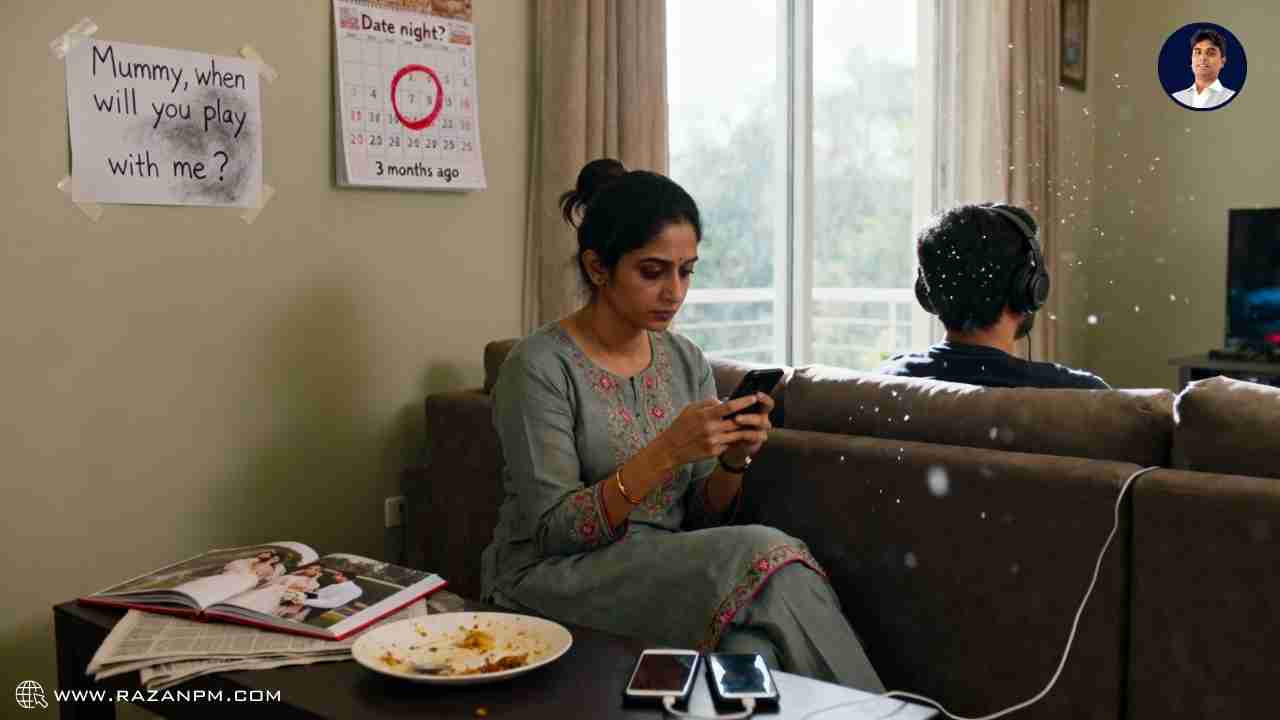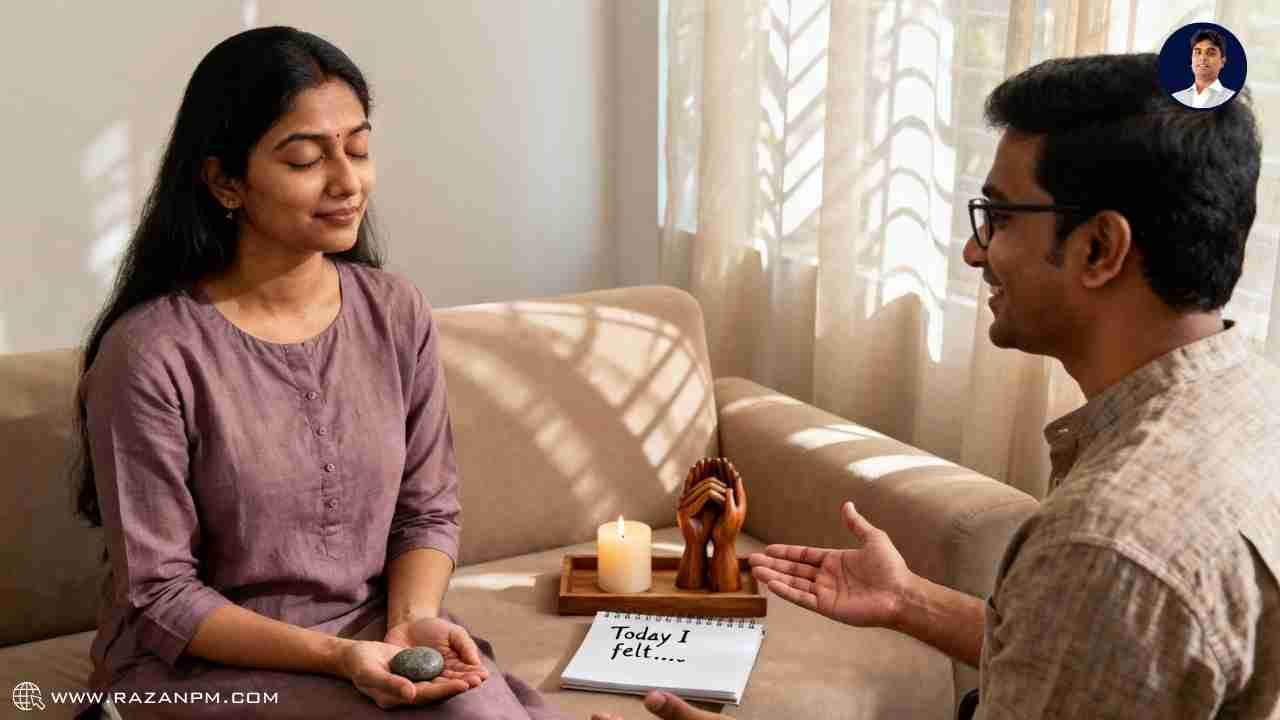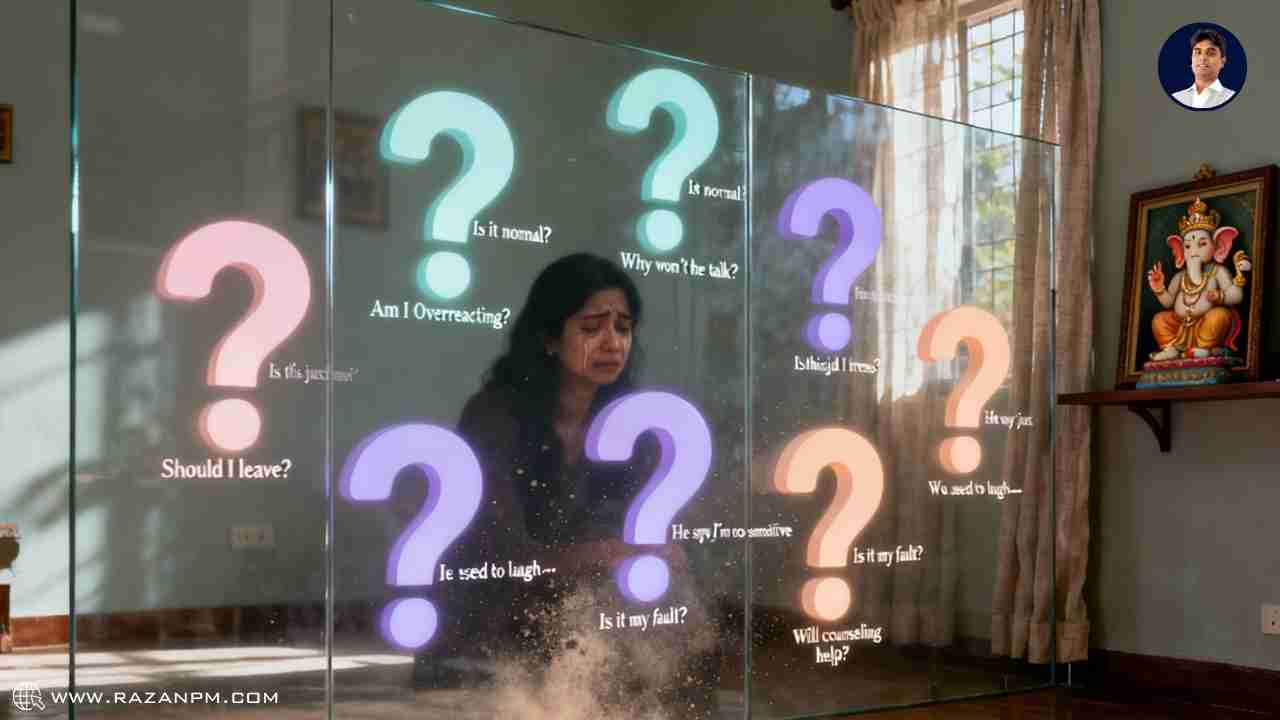You know that moment when your husband forgets to reply to your message, or scrolls through Instagram while you’re talking about your day? At first, you laugh it off — “He must be busy.”
But slowly, those little silences start talking louder than words. You start overthinking — “Maybe I’m not important anymore.”
From a tiny doubt grows a garden of fear. Before you know it, you’re lying awake at night, replaying every small moment… and wondering when love turned into loneliness.
Humor aside — it’s funny how we women can turn a one-word text into a full-blown psychological thriller in our minds! 😂
But behind that humor hides something very real — emotional distance — a slow, silent disconnection that can make a wife feel invisible, even while living under the same roof.
also read: why your partner cant read yourmind?

As a Govt.Recognized Counsellor & Mind Healer, I’ve sat across from many wives who whisper the same sentence with trembling lips —
“He’s right there beside me… but I feel so alone.”
It’s not that there’s no love. It’s that the emotional bridge is broken.
You share a home, meals, even a bed — but not your hearts.
You start questioning yourself —
And yet, your soul aches for something more — a simple “How was your day?” that’s said with real presence, not routine.
That ache, my dear reader, is emotional neglect — and it can be as damaging as physical distance.
also read: why quiet relationships often meandisconnection?

Here are some subtle signs that emotional distance has crept into your marriage —
1. Conversations feel like chores, not connections.
2. Physical closeness without emotional warmth — hugs feel mechanical.
3. You hesitate to share your feelings, fearing judgment or indifference.
4. You feel unseen, unheard, and unvalued.
5. You seek validation outside — from friends, family, or even social media likes.
6. Small arguments escalate quickly, because there’s a lot unsaid beneath them.
7. You miss “us” — the laughter, the late-night talks, the sense of being a team.
If these sound familiar, you’re not “too sensitive.” You’re simply human — wired for emotional connection.
also read: why gen z couples regret moving intoo soon?
According to the DSM-5 (Diagnostic and Statistical Manual of Mental Disorders) and ICD-11 (International Classification of Diseases), prolonged emotional neglect and relational disconnection can contribute to:
When your emotional needs aren’t met, your amygdala (the brain’s fear center) becomes hyperactive. You stay in a low-level “fight or flight” mode — your body literally starts to feel unsafe in your own relationship.
This is why so many wives say, “I feel anxious even when everything looks fine.”
It’s your mind signaling: “I’m not being emotionally held.”
also read: how past trauma shapes your healthtoday?

Research from Dr. John Gottman, one of the world’s leading marriage researchers, shows that emotional withdrawal (like ignoring, stonewalling, or minimal response) is one of the biggest predictors of relationship breakdown.
A 2021 study published in the Journal of Family Psychology also found that emotional neglect impacts women’s self-esteem, sleep quality, and even physical health — headaches, fatigue, and muscle tension.
Another fascinating study from Harvard University on long-term relationships revealed:
“The strength of emotional connection — not material comfort — is the biggest factor in long-term happiness.”
So, it’s not “too much to ask” to want emotional intimacy. It’s actually a psychological necessity.
also read: 7 signs your addiction may be hidingdepression
Let me share a story — one that still stays with me.
A client, let’s call her Riya, came to me saying, “Doctor, I feel like a ghost in my own home.”
Her husband wasn’t abusive. He wasn’t unfaithful. He was simply… absent.
He was physically present — the provider, the father — but emotionally, he had checked out.
Riya stopped sharing her feelings because “he won’t understand anyway.”
Gradually, she started doubting her own worth. She dressed up less, laughed less, lived less.
Until one day, her 8-year-old daughter asked,
“Mama, why are you always sad even when Daddy is home?”
That was the breaking point — and also the turning point.
Through therapy, Riya learned that her loneliness wasn’t her fault. It was a symptom of emotional disconnection — a gap that needed communication, not blame.
Step by step, she rebuilt her confidence, learned emotional expression, and reconnected with herself first — because healing always begins within.
also read: 5 ways couples reignite love after along break

Here’s a small yet powerful exercise I often suggest to couples dealing with emotional distance:
Step 1: Sit together, without phones or distractions.
Step 2: Each person answers two simple questions:
Step 3: The other listens — really listens — without correcting, fixing, or interrupting.
You’d be surprised how this tiny ritual melts years of silence.
Because emotional connection isn’t built by grand gestures — it’s built by small moments of presence.
also read: how texting culture is changing genz relationships
Of course, this exercise is just the beginning.
True emotional reconnection involves identifying your emotional triggers, healing past attachment wounds, and relearning how to communicate vulnerability.
These deeper layers often need a safe space — guided by a professional who understands both psychology and the language of emotions.
Think of it like physiotherapy for your mind and marriage — gentle, consistent, and healing over time.
also read: the real psychology behind left onread anxiety
If any part of this blog resonated with you — that quiet ache, that invisible wall between you and your partner — please know this:
You’re not “too emotional.” You’re just longing for real connection.
As a Govt.Recognized Counsellor & Mind Healer, I help women like you rebuild emotional bridges, rediscover self-worth, and learn how to express needs without guilt or fear.
❤️ If this feels familiar, you don’t have to figure it out alone. Book your consultation here.
Because healing starts the moment you stop pretending you’re fine.
👉 Begin Your Journey with a 1 on 1 Consultation
👉 Begin Your Journey with a 1 on 1 Consultation

Many wives feel invisible when emotional connection fades despite physical presence. Emotional neglect or lack of communication can create a sense of loneliness and disconnection.
also read: how disorders like insomnia fueldepression?
Early signs include reduced conversations, lack of eye contact, emotional withdrawal, or avoiding sharing personal thoughts. Small silences can grow into deep emotional gaps over time.
also read: how isolation triggers illness anddepression together?
Yes, emotional neglect can trigger chronic stress, anxiety, and even depressive symptoms as the brain interprets emotional isolation as a threat to safety and connection.
also read: how to stop the cycle of pain anddepression?
Start with small, daily connection rituals — 10-minute talks, active listening, or sharing emotions without blame. Consistency matters more than grand gestures.
also read: what to do when i love you gets noreply?
If loneliness, resentment, or lack of communication persist despite efforts, it’s time to reach out to a Clinical Psychologist or Marriage Therapist for guided healing.
also read: how fear of rejection kills realconnection?
Yes, it’s common, especially when life stress, work, or routines take over. The key is to identify emotional gaps early and rebuild emotional intimacy intentionally.
